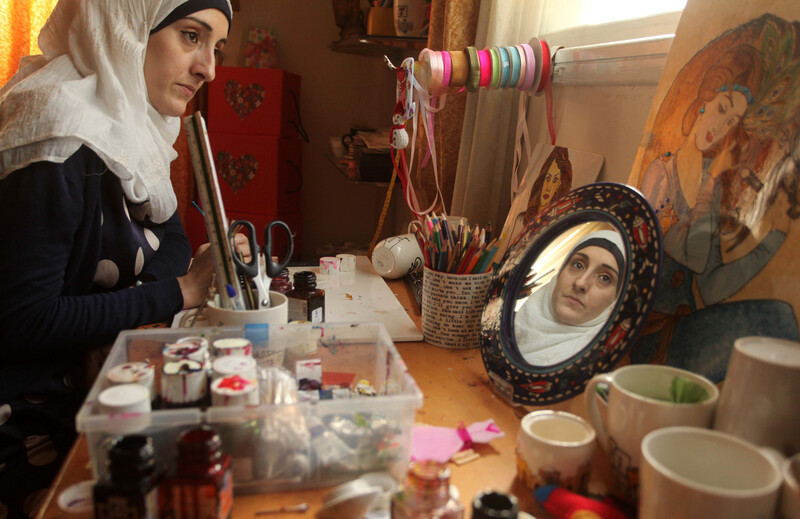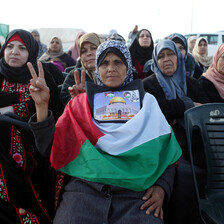The Electronic Intifada Gaza Strip 23 November 2015

Artist Dima Shashaa’s career has been severely curtailed because she can’t get a Palestinian ID.
APA imagesReem Hajjaj finds it almost impossible to take an elective medical course outside the Gaza Strip. Unlike her fellow students in the Islamic University of Gaza’s medical school, she does not have a Palestinian Authority identity card.
Hajjaj says that this situation has thwarted a lot of her plans.
The fifth-year Palestinian medical student came from Saudi Arabia to Gaza with her family in 2006. Their visitors’ permits expired before they were able to depart. As a result, the family have been stranded in Gaza, unable to leave without the required documents.
Medical faculty in the Islamic University coordinate with their peers in other countries, including the United Kingdom, Malaysia and Jordan, in order to let students take two-month elective courses abroad.
Yet this remains a distant dream for Hajjaj.
“All of this because of a piece of paper,” she said.
The fact that Hajjaj’s parents cannot travel to visit Palestine’s holy places — Israel bans Palestinian movement even between the occupied West Bank and Gaza Strip — deeply upsets the couple.
“We are deprived of our right to free movement. We are stuck here almost with a life sentence,” Hajjaj’s father, Adel, said.
Diaa Muhammad was born in Gaza but lived in Kuwait for 30 years, where she was also married. Neither she nor any of her four sons have an identity card.
The 67-year-old faces a lot of trouble when she needs medical services from government facilities.
“I have to use my sister’s identity card to be able to have access to the medical care sector,” Muhammad said. “Things will definitely go wrong when my sister needs to visit any of these medical clinics.”
Muhammad needs to go abroad for specialized treatment on her right eye that is not available in Gaza. But she lacks an ID or passport that would enable her to cross the borders.
“They recommended that I have the operation in Jordan, but that will be impossible. We can’t go anywhere,” she said.
“Israel’s responsibility”
According to Nasser Sarraj, the deputy of the civil affairs ministry in Gaza, Hajjaj and Muhammad are only two cases from among the 40,000 to 50,000 Palestinians in Gaza who do not have ID cards or any official status recognized by Israel, which controls the population registry.
“This situation is a product of Israeli policy, and it is Israel’s responsibility to change it,” he said.
Although the Palestinian Authority issues identity cards, it’s Israel that ultimately determines who gets approved or not.
The problem stems back to the 1967 War, when hundreds of thousands of Palestinians temporarily fled the Gaza Strip and the West Bank. Israel then withdrew their names from the Palestinian civil registry, stripping them of their right to reside in those territories newly occupied by its military.
Under the Oslo accords signed by Israel and the Palestine Liberation Organization in the mid-1990s, Israel supposedly transferred responsibility for civil and social affairs to the newly created Palestinian Authority — but only on the condition that it wielded veto power over all decisions made by the PA.
After the eruption of the second Palestinian intifada in September 2000, Israel refused to recognize any changes to the civil register made by the Palestinian Authority.
“The Israeli side was no longer responding to any of the reunification applications made by Palestinian expatriates or to issue them ID cards,” Sarraj said.
A Palestinian without an identity card is permitted to apply for family reunification if one of his or her parents holds an identity card. But that mechanism has been frozen by Israel for years.
The civil affairs ministry’s Sarraj said that his office received more than 5,000 requests for ID cards, yet none have been issued.
Unbearable
Not having an ID has stalled the career of artist Dima Shashaa.
“I was forced to decline work opportunities in the Gulf states since I do not have a passport or ID card that can enable me to travel,” she said.
Shashaa’s family came to Gaza in 1994 and have been stuck there ever since.
She cannot receive money transfers from her international customers who have purchased her work online.
The Shashaa family’s application for reunification was frozen along with those of countless other Palestinians.
Shashaa said that it has been a long time since the family has inquired about the status of their file.
“Over time, we’ve all but lost hope of ever receiving ID cards,” she said.
Isra Saleh el-Namey is a journalist from Gaza.





